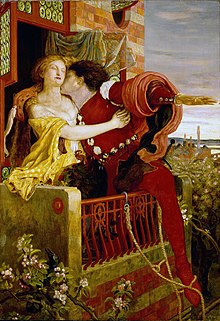| Romeo Montague | |
|---|---|
| Romeo and Juliet character | |
 The balcony scene in Romeo and Juliet as depicted by Ford Madox Brown (1869-70) | |
| First appearance |
|
| Created by | Luigi da Porto, William Shakespeare |
| Based on | Romeus, from The Tragical History of Romeus and Juliet (1562) |
| In-universe information | |
| Affiliation | |
| Family |
|
| Spouse | Juliet Montague |
| Nationality | Italian |
Romeo Montague (Italian: Romeo Montecchi) is the male protagonist of William Shakespeare's tragedy Romeo and Juliet . The son of Lord Montague and his wife, Lady Montague, he secretly loves and marries Juliet, a member of the rival House of Capulet, through a priest named Friar Laurence.
Contents
Forced into exile after slaying Juliet's cousin, Tybalt, in a duel, Romeo dies by suicide upon hearing falsely of Juliet's death.
The character's origins can be traced as far back as Pyramus, who appears in Ovid's Metamorphoses , but the first modern incarnation of Romeo is Mariotto in the 33rd of Masuccio Salernitano's Il Novellino (1476). This story was reworked in 1524 by Luigi da Porto as Giulietta e Romeo (published posthumously in 1531). Da Porto named the character Romeo Montecchi, and the storyline is nearly the same as Shakespeare's adaptation. [1] Since no 16th-century direct English translation of Giulietta e Romeo is known, Shakespeare's main source is thought to be Arthur Brooke's English verse translation of a French translation of a 1554 adaptation by Matteo Bandello. [2] Although both Salernitana and da Porto claimed that their stories had a historical basis, there is little evidence that this is the case.
Romeo, an only child like Juliet, is one of the most important characters of the play and has a consistent presence throughout it. His role as an idealistic lover has led the word "Romeo" to become a synonym for a passionate male lover in various languages. Although often treated as such, it is not clear that "Montague" is a surname in the modern sense.